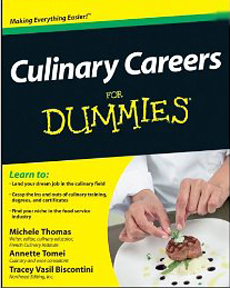BOOK: Thinking About A Culinary Career?
|
With all the media attention on superstar chefs, prime-time cooking shows and the evolved view of a gourmet chef from a behind-the-scenes craftsman to a lauded artist, many people dream of entering the culinary field.
But as with everything else, behind the perceived glamor is a lot of grunt work. The authors of the new book, Culinary Careers For Dummies, provide the insights needed to enter and excel in the food service industry. Authors Michele Thomas, Annette Tomei and Tracey Biscontini shared these 10 insider tips: 1. Be ready to start at the bottom. No matter how lofty your goals might be, be prepared to start at square one. Even celebrity chefs started there. Your first job may not be what you want (in fact, it might feel frustrating and difficult), but it will give you the chance to prove your skill and dedication. Remind yourself that while you’re “only” washing dishes and prepping salads, in a year or so you’ll be moving up the ranks. Take this opportunity to observe, to hone your skills and interests and to learn as much as you can. |
 A welcome gift for anyone considering a culinary career. Photo courtesy Wiley & Sons. |
|
|
2. Take courses related to your interests. If you don’t want to complete a degree or certification, taking classes can help hone your skills and keep you abreast of industry trends and advances. Also consider non- food-related courses: A writing class might give you the skills you need to become a food writer, a chemistry course might help you to become a food scientist. 3. Find a mentor in your field of interest. If you meet someone in your field who shows a willingness to befriend and help you, take advantage of this tremendous resource. A mentor might or might not work directly with you (these days, you might converse online from across the country), but he or she will have your best interests at heart and will give you honest advice to help you improve. Check chef-oriented websites and online professional groups, and don’t be shy about asking for advice. 4. Work well with others. Forget the bad attitudes and behavior displayed on Hell’s Kitchen and other reality TV shows: It’s encouraged because it attracts higher ratings. Don’t underestimate the value of interacting efficiently and respectfully with others: An inability to work harmoniously as part of a team can stop your career in its tracks. Also keep in mind that while you may think you know what you’re doing, you need to remain open to constructive criticism. 5. Make time to read. The culinary industry is far from static; on the contrary, it’s constantly changing. To remain cutting-edge and competitive, it’s important to stay abreast of current and rising trends. You don’t have to devote every spare moment to scouring industry magazines and journals, but it is a good idea to look through these types of publications—as well as credible blogs, cookbooks, and even the food section of the newspaper—on a regular basis. 6. Choose a specialization. Just as with a college major, it’s important to select a specialization. Otherwise, you can drift from job to job with no clear goal in mind. This can be as simple as deciding whether you want to work with a specific cuisine, such as Italian food, or that you want to work with traditionally prepared foods as opposed to modern cuisine. Take extra courses, read the appropriate literature and perfect your skills before telling employers that you have a specialty. And as with a major, you can always switch. 7. Learn to manage time skillfully. If you’re not already a good time manager, study up on good techniques. Time management is especially important in the food industry, since food can lose texture, temperature or taste easily if not timed perfectly. 8. Be open to new ideas. You don’t need to incorporate every new product, idea, or technique into your work, but do consider those that come your way. If you don’t try new options, you’ll soon find yourself stuck in the past, losing your colleagues’ respect. 10. Broaden your skill set. You may come across some great opportunities if you choose to specialize in a particular area of the culinary industry. But you may find even better jobs if you keep your eyes and ears open and continue to learn new skills. The more you can do, the more marketable you will be. For example, a company might want to hire a chef who’s a computer whiz, because that person can help design food-purchasing software. As a next step, anyone with a love of cooking—and dreams to turn it into a career—should get a copy of Culinary Careers For Dummies. And don’t be offended by the name, “For Dummies.” It has more pizzazz than “For Those Seeking Enlightenment.”
|
||